Student Voices on Pride
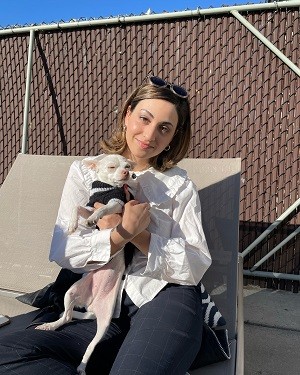
Marissa Bokhari (she/they), MPH Candidate, Department of Epidemiology
How do you celebrate Pride?
I like to re-watch my favorite documentary, Paris is Burning, and immerse myself in queer cinema. Queer people have always recorded their experiences as a way to resist erasure, and there’s so much media that the culture is just now beginning to resurface and collectively celebrate. When I’m back home in Chicago, I go out in Boystown, go to drag brunch at Roscoe’s, and go to the pride parade— the communities in all these spaces really helped me discover and celebrate my sexuality and gender expression early on.
How has Pride's meaning changed for you, if at all, since the pandemic?
I’ve had a lot more time to reflect about our culture where gay marriage is finally legal and queer people are gaining broader cultural acceptance. The goal of pride was originally to celebrate lives that the state was actively trying to end, and now that goal has in some ways been achieved. Pride should and will evolve at the behest of people and their lived experiences and narratives, rather than corporate sponsors. I’ve also been thinking about the way in which pride is a kind of big tent celebration, and how within such a broad and diverse category, we can continue to promote trans and queer BIPOC stories alongside the rest.
What are you most looking forward to this year during Pride month?
Pride is coming at the perfect moment when people are getting vaccinated and going back to their lives. I’m excited to be able to go to clubs and hug my friends! The gay bar has always been an important space in the movement, and we can safely return to them under certain conditions now that we’re seeing data on vaccine efficacy.
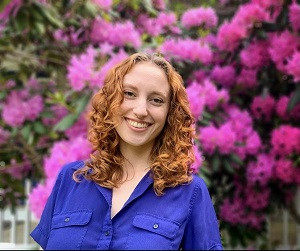
Madison Clague (she/her/hers), MPH Candidate, Department of Sociomedical Science
How do you celebrate Pride?
I usually go to the parade or volunteer in a booth and spend as much time with friends and family as I can.
How has Pride's meaning changed for you, if at all, since the pandemic?
The past year has made me really appreciate the different ways we find community and belonging and that certainly includes my experience with Pride. Being isolated from friends and family and joining the Columbia community virtually makes the moments of connection even more precious.
What are you most looking forward to this year during Pride month?
I am most looking forward to celebrating with friends and enjoying the energy of NYC during Pride again!
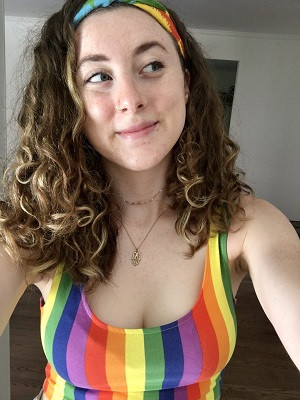
Haley Goss-Holmes (she/her/hers), MPH Candidate, Department of Epidemiology
How do you celebrate Pride?
My celebration of pride is both internal and external. Internally, I celebrate pride by appreciating and loving who I am as a person, especially the aspects that have historically been a source of shame. Instead, I allow myself to feel joy. Externally, I celebrate pride by spending time with my queer friends, whether that’s out at gay and lesbian bars, the pride parade itself, or just at each other’s places.
How has Pride's meaning changed for you, if at all, since the pandemic?
The meaning of pride has not changed, but the celebratory aspect was definitely dampened for me last year. Being surrounded by such a wonderful, vibrant, and supportive community is a highlight of pride month for me and I missed that interaction. But the essence of pride, loving and celebrating who you truly are, remains constant.
What are you most looking forward to this year during Pride month?
I am hosting an annual BBQueer with my gay family and get to hug some friends who I haven’t seen in a year!
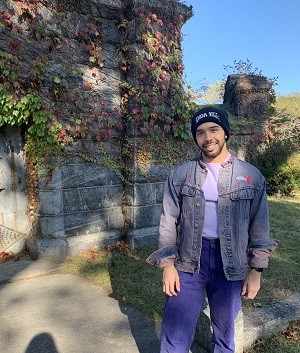
Lucas René Ramos (he/him/his), Graduate School of Arts and Sciences, History
How do you celebrate Pride?
As an historian of sexuality, Pride is a difficult subject to explain, let alone to celebrate. If we're not careful with how we celebrate Pride, for example, it could turn into a form of homonationalism and pinkwashing, delimited by a single month of momentary recognition. But it’s also the month when all kinds of people can come together, celebrate their sexualities, and find community with one another. I personally “celebrate" Pride by writing about the history of the problem that I have just outlined, through my program and the Columbia Research Initiative on the Global History of Sexualities: How do I celebrate but recognize the consequences of Pride? Of course, I’ve celebrated by going to festivals in the past years. I was fortunate to once serve as a policy fellow at the National LGBTQ Taskforce and assist in coordinating its part in the D.C. Equality March. Most importantly, I’ve celebrated Pride by reaching out to those that I am close to in my community and just catching up with them. Many of my LGBTQIA+ friends are scattered around the world, and I’ve always been more of a digital person anyway.
How has Pride's meaning changed for you, if at all, since the pandemic?
I think that Pride is often considered to be about intimacy and community-building. Our inability to partake in a physical festival last year had me rethink what Pride means to me. The first time that I celebrated my form of Pride was my freshman year of college, when the Orlando Pulse nightclub shooting happened. I was studying abroad, far away from Florida (where I grew up), and new to accepting my identity. Three of us held a vigil for the Latine lives lost; then the next year, I cautiously went to a parade. With the pandemic declining, I contemplate my community’s safety. During the worst of the pandemic, I sat on the fact that Pride never felt like a place where my intersectional identity was readily accepted, and most activities carried many fees. So this year, Pride is something I share with close friends, visiting nice hotspots for queer life, and posting on Instagram. In fact, I feel most prideful when I scroll through my Tiktok feed and see all the different ways people express their sexual and gender identities.
What are you most looking forward to this year during Pride month?
While I hope I can participate in Italy’s Pride this year (a country that I study as a History Ph.D. student), I look forward to just seeing old friends. I look forward to seeing how different Pride festivals recover from the pandemic as we eventually return to a semi-normal. At the moment, I’m in Florida and I hope to see what events happen here too. As a historian, I also look forward to the different editorials that will inevitably come out critiquing and promoting how we celebrate Pride—it’s a hot topic to do so!
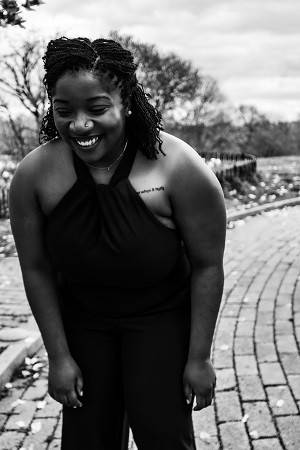
Brendane Tynes (she/her/hers), Ph.D. Candidate, Anthropology
How do you celebrate Pride? How has Pride's meaning changed for you, if at all, since the pandemic?
In my opinion, Pride is the commercial recognition of life that I’ve always known in some ways. I’ve only done an “official” Pride celebration once in my adult life. I usually celebrate my queerness every moment that I can. It’s inescapable. What I love most about being queer is that I get to love myself and others on my own terms, rather than through cissexist, heteronormative scripts that dictate how love should be. In my Blackness & my queerness, I find freedom. I find love like no other.
How has Pride's meaning changed for you, if at all, since the pandemic?
I used to celebrate in person with my chosen family. My birthday is during June as well, so my celebrations during this month with my chosen family mean even more to me. Since the pandemic started, we’ve been celebrating each other virtually via Facetime or Zoom.
What are you most looking forward to this year during Pride month?
I look forward to celebrating my birthday and spending time with family.
